There was no specific moment when we decided to go plant-based. It just happened slowly over time with every new piece of information we learned. In this post, we’re going to share the three top reasons why we live on a plant-based diet, how we did it, and which nutrients we supplement to stay healthy.
Our transition to a plant-based diet began after watching the documentary Cowspiracy. To hear and see the ugly truth about the dairy and livestock industry was like a punch into the face. We started rethinking about many behaviors and actions of our everyday life. At some point in time, we realized that we feel much better and no longer had the desire to eat animals or any other food of which animals are involved in the manufacturing process. We suddenly became vegans and, since then, never wanted and never will go back.
Top 3 reasons why you should go plant-based
Health benefits of a plant-based diet
If you don’t have any conditions, it’s sometimes tricky to measure the effects a specific lifestyle change like moving to a plant-based diet may have onto the body. Luckily, we never suffered from illness and didn’t have to take any medications.
More energy, better skin, and a more robust immune system
But there’s a thing with illnesses and how healthy you feel. You never know precisely where on the scale you are. You may feel energized and healthy, but your metabolism is only running on 70% efficiency. Therefore, we may falsely assume that we are already performing at the highest levels when we are not.
We definitively didn’t perform at our best. After cutting out meat and dairy, our energy levels increased, our immune system got more robust, and the digestion, as well as the skin, improved. We didn’t feel better overnight, and some aspects, especially the skin, took some time to get better. Constantly feeling better, we realized that the food choices we make have a direct impact on how we feel and look. As soon as we incorporated intermittent fasting into our lifestyles too, our energy levels increased even more. But that’s another story.
Healthy and robust cells because of more micronutrients
There are multiple reasons why a plant-based diet is contributing to our wellbeing. Plants contain vast amounts of antioxidative and cell-protecting micronutrients like vitamins, minerals, and phytochemicals. Think of our body as a highly sophisticated machine of tiny gearwheels that all interlock and each gearwheel represents a nutrient. If one or two gearwheels are failing, the system may be able to compensate for this shortage. But the more gearwheels fail, the higher the risk of developing a disease.
Stronger bones and less inflammation
Furthermore, plants are anti-inflammatory and, in most cases, alkaline. Animal-based proteins do over acidify our bodies and produce inflammation. Statistics show that in countries with high consumption of dairy, more people have a hip fracture due to weak bones than in countries with less milk consumption. Although milk contains calcium, drinking, it forces the body to release calcium stored in the bones to neutralize the over-acidification caused by the milk-protein. Besides, inflammation is subject to be the underlying cause of many, if not all, diseases. Therefore, it’s best to eat as many anti-inflammatory foods as possible to support health.
Lower risk of food poisoning while traveling
On our travels, we realized that eating only plant-based food has another significant advantage. As most of the bacterial infections come from animal food, choosing only plant-based options highly reduces the risk of getting sick.
These are only a few examples, and there is so much study going on in the field of nutrition. If you’re interested in reading about all the details and facts on the health benefits of a plant-based diet, we highly recommend the book How Not to Die from Dr. Michael Greger.
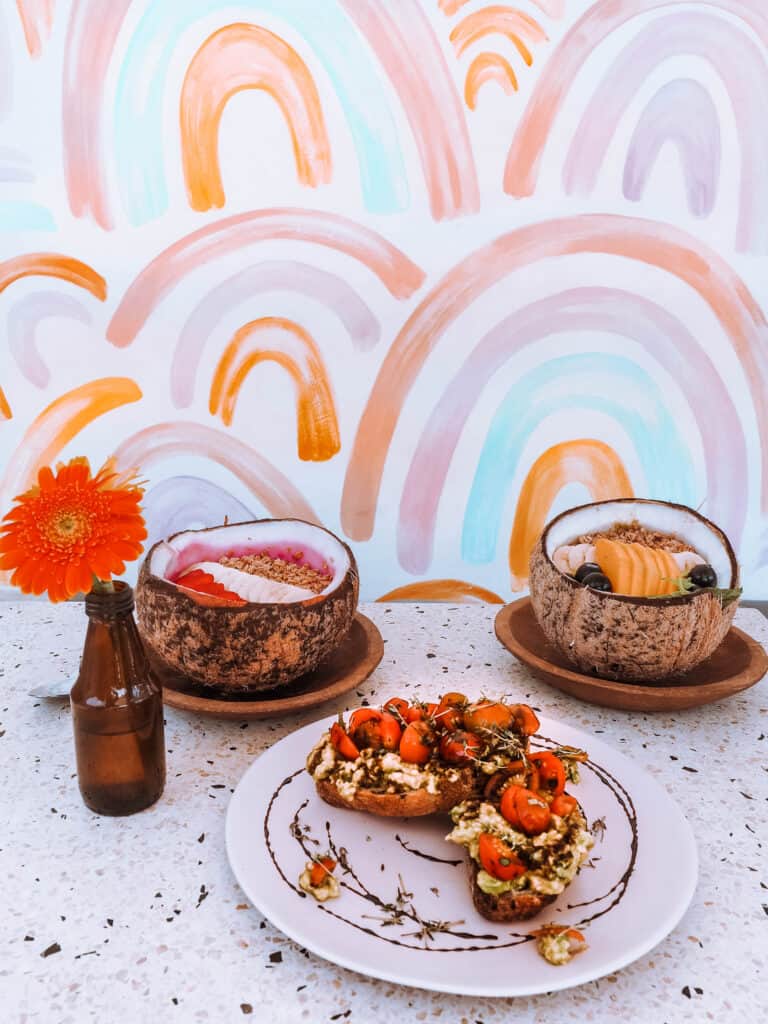

How eating plant-based helps the environment
Right now, our planet is facing a global climate crisis. The atmosphere is heating up, the arctic ice is melting, continents are burning, species becoming extinct, corals are dying, and the oceans get polluted, just to mention some of the many extreme situations which are happening right in front of our eyes.
Livestock and greenhouse gases
Mainly carbon dioxide and, therefore, cars, planes, and ships are blamed as the leading cause of this human-made disaster. But studies show that 51% percent of all greenhouse gases come from livestock and their byproducts. In comparison, all transportation combined is responsible for only thirteen percent of worldwide greenhouse gases. Besides, cows produce 150 billion tons of methane per day. A greenhouse gas that is 25 to 100 times more destructive and which has 86 times higher global warming potential than carbon dioxide. Furthermore, animal agriculture is responsible for up to 91 percent of amazon’s destruction.
Deforestation, water pollution, and starving people
It’s like a downward spiral. Not only is livestock creating vast amounts of greenhouse gas emissions, but it’s also the number one driver in deforestation and, therefore, reduces the earth’s ability to clean the air. Besides, animal agriculture pollutes our oceans and drinking water. On top of that, eighty-two percent of starving children live in countries where food is fed to animals, which are eaten by western countries.
Excessive consumption of low-quality animal food
We are sure that even a reduction in meat and dairy consumption would have a substantial positive impact. We also know that the climate crisis is not only happening because humans are eating animal-based food. Humans did that ever since. The difference to then is that nowadays we eat and therefore produce way too much of it. Farmers who work in balance with nature aren’t the problem and are in no way to blame. It’s the highly efficient meat and dairy industry as well as the quantity-over-quality and cheaper-is-better mentality, which has brought us to this point.
Let’s work together instead of blaming each other
If we want to fix the climate issue, humanity has a lot of problems to solve. The key to success is to stop blaming each other and instead work together and help each other. Therefore we don’t blame any meat-eater or milk-drinker out there. Everyone has to make up his mind by him- or herself. Our goal is to inspire and make people reevaluate their food choices because every small step in the right direction makes a huge difference.
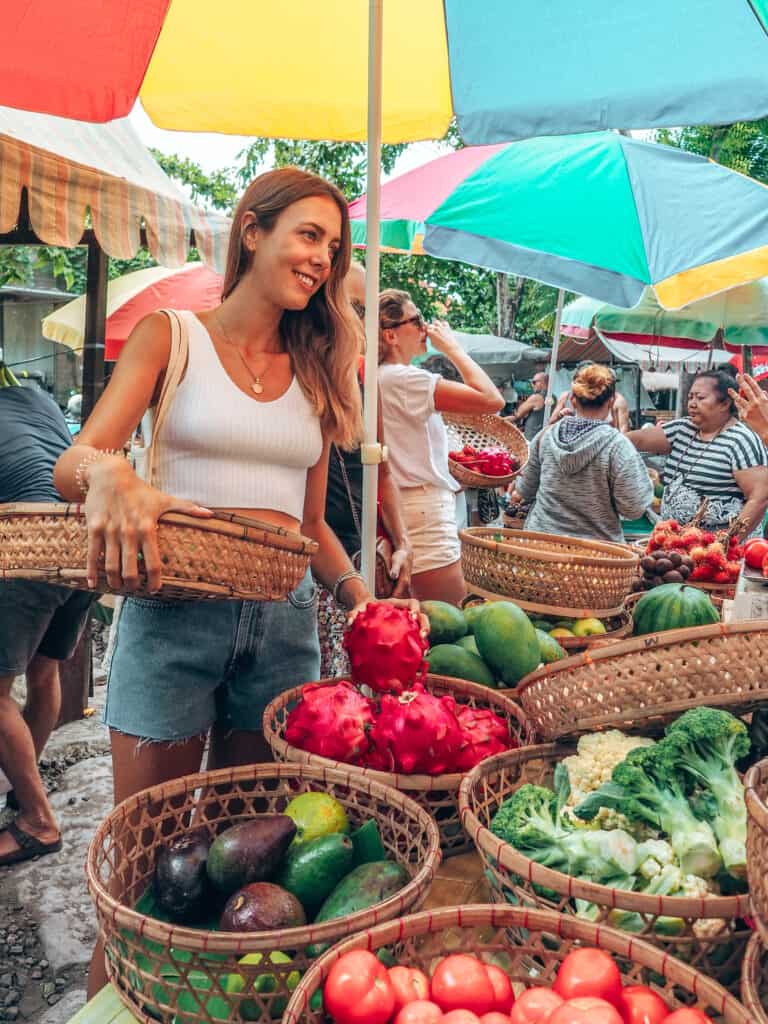
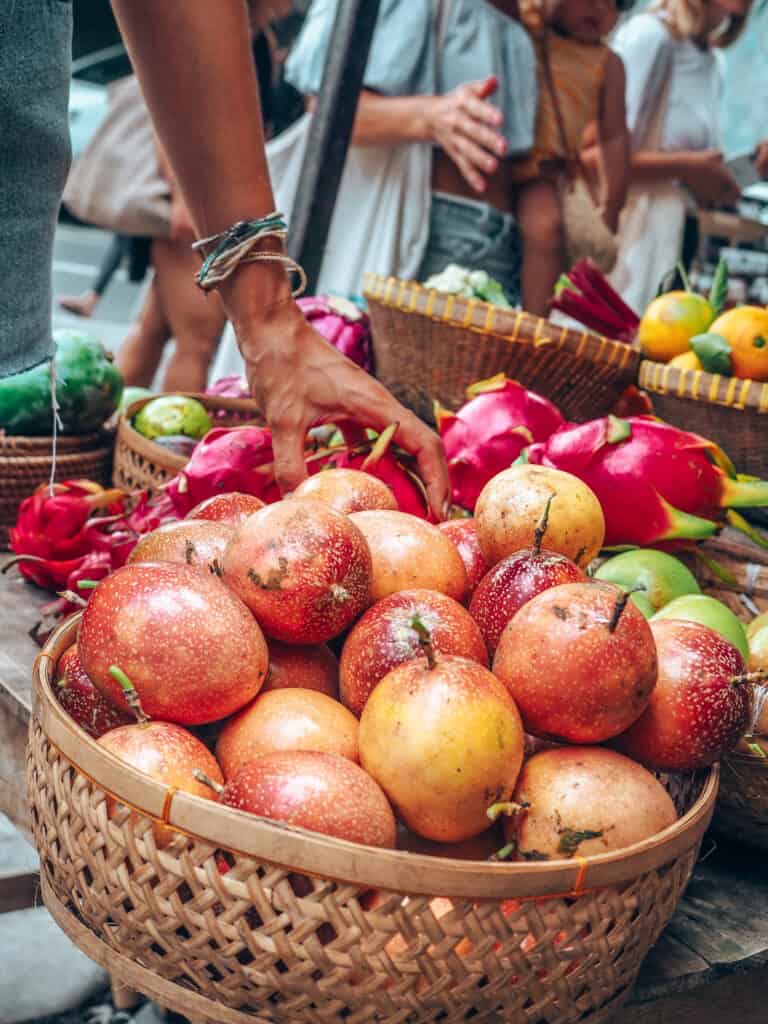
Animals are friends, not food
If slaughterhouses had glass walls
Paul McCartney once said, if slaughterhouses had glass walls, everyone would be vegetarian. We fully agree with this statement and believe that the overconsumption of animal-based food of today exists because we aren’t aware anymore what’s behind the food on our plate. It got too convenient for us to just walk into the supermarket and grab a plastic-wrapped piece of meat out of the fridge. Not knowing or ignoring the story behind it.
Forced pregnancy, stolen calves, and other cruelties
We decided to look at animals as friends, not food anymore. For us, it makes no sense to love cats and dogs but kill pigs, cows, and chickens, especially when there’s a better alternative that doesn’t involve fear, pain, and killing. To know that female cows are forced to pregnancy and have their calves taken away right after birth over and over again makes us feel sick, especially as all this happens just to steal the mother’s milk, which is for calves and not suitable for humans. Similar cruel things happen to cattle, chickens, and pigs. They get locked up in tiny cages and have to live in their dirt and sometimes never see a single ray of sunlight in their life. Besides, they get their horns, teeth, and tails cut off without anesthetics and will be fattened so fast, that at the end of their short life, their muscles can’t carry them anymore.
Resistant bacterias because of overuse of antibiotics
Furthermore, they get pumped up with antibiotics to prevent diseases from spreading among the animals as they have to vegetate on too little space. The same antibiotics that we humans use to fight deadly bacterias, which, unfortunately, are getting more and more resistant because of the overuse of antibiotics. Scientists are saying that the biggest threat for humanity consists of losing antibiotics as a weapon against deadly infections. If this would happen, we’re back in the middle-age.
Educate yourself with these mind-blowing documentaries
We always were aware that eating animals and drinking milk is related to some level of cruelty. But we never expected that the meat and dairy industry is responsible for that much pain and death. Of the many eye-opening documentaries out there, we urge everyone to watch at least Cowspiracy. We guarantee that you won’t look at animal food the same way as before. Other mind-blowing documentaries are Before the Flood, Food Choices, What the Health, Dominion, and Earthlings.
Vegan for beginners
How to become a vegan step by step
Stop eating animals and dairy may sound overwhelming at the beginning, but it’s not. Just don’t make a mistake and try to go plant-based overnight. Depending on how much meat and dairy you eat per day, it may be a bit harder at the beginning. The following steps are those we took on our way to a plant-based diet.
First, identify animal-based foods
First, we identified which of the foods we consumed were somehow related to animal sources. Examples may be milk in the coffee, milk powder, or egg in cookies or pasta or cheese in all kinds of products, etc. We had to read many product labels and had to do some research to understand which ingredients are animal-based. Therefore this step took us some time.
Second, remove or replace them
As a second step, we successively looked at the previously identified foods and either removed it from our diet or replaced it with a plant-based alternative. As we used to drink our coffee with milk, we tried to replace it with soy milk. Unfortunately, that doesn’t taste the same, and so we skipped it and now drink black coffee. Later on, we found cashew to be a delicious alternative for cows milk in coffee.
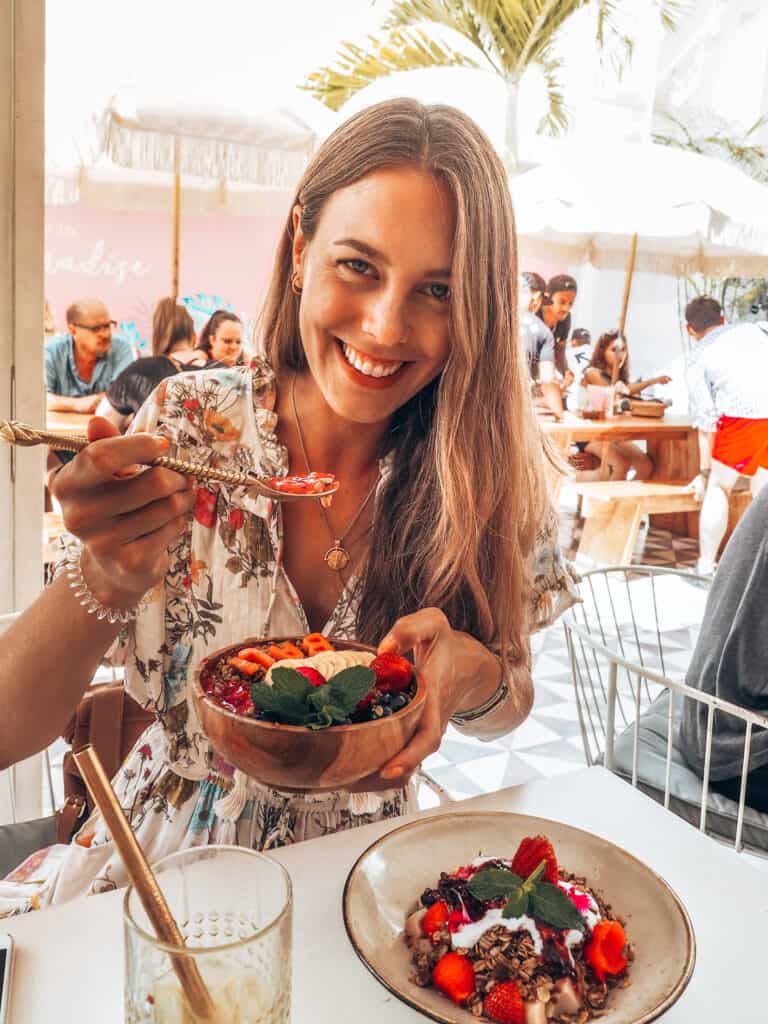
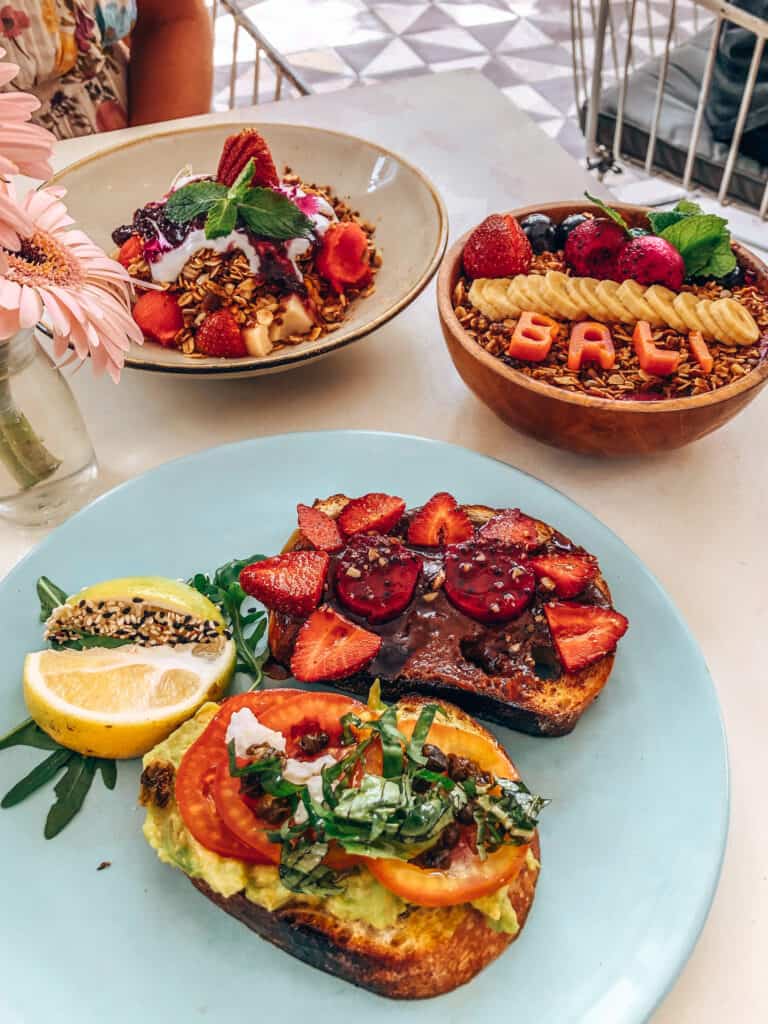
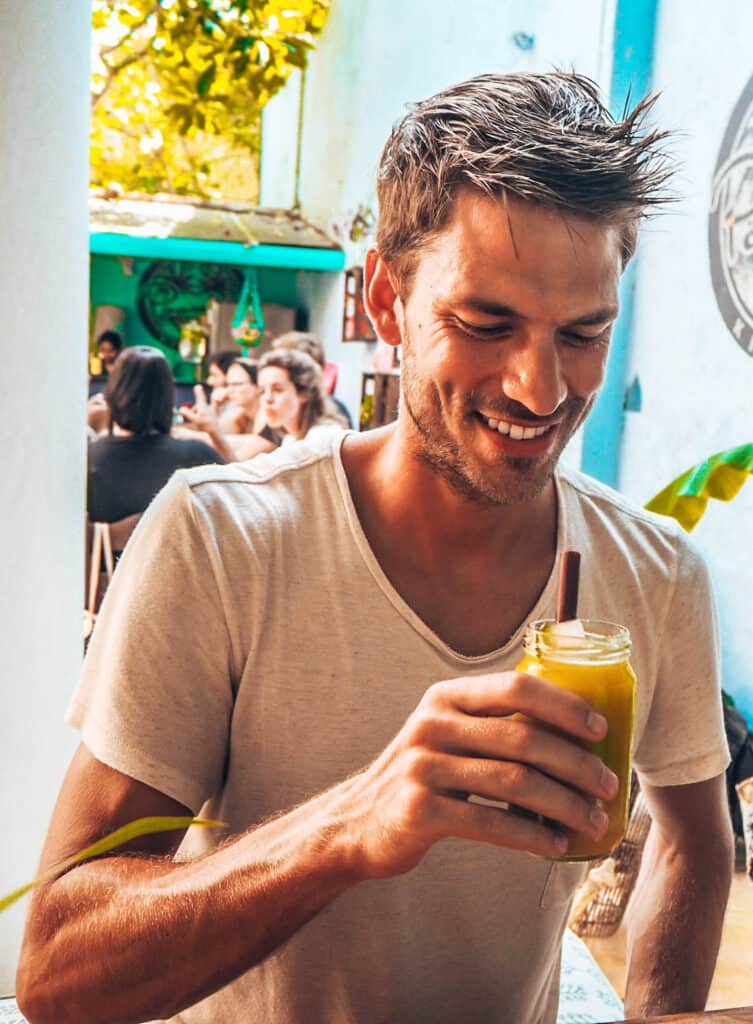
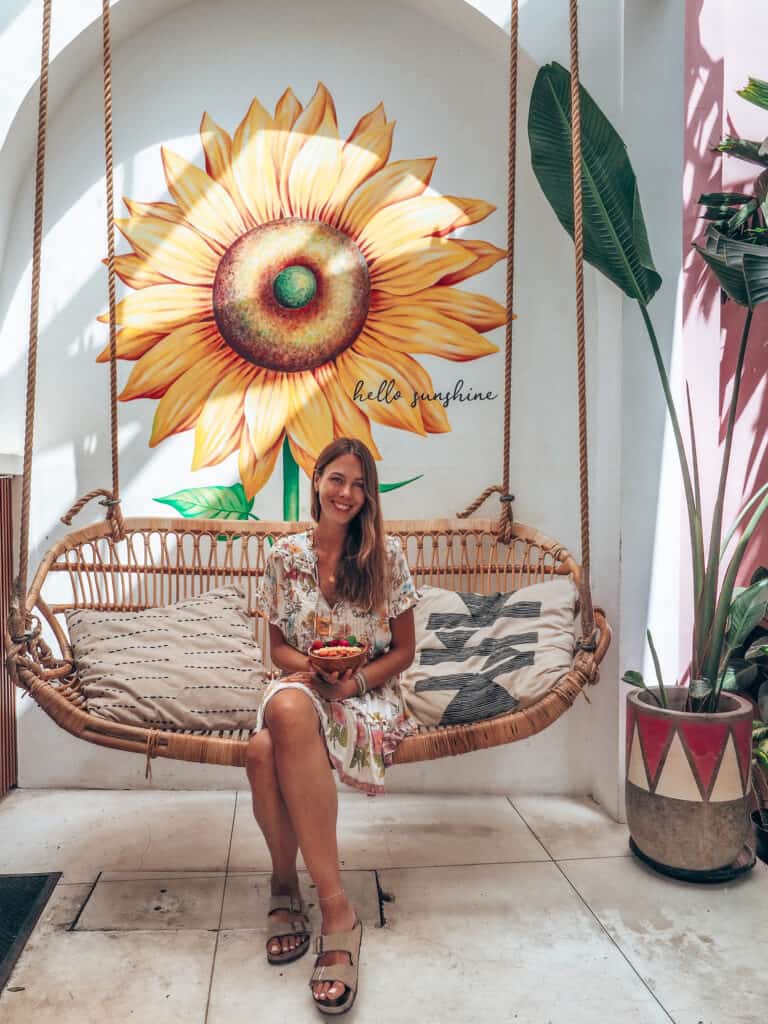
What to eat instead of meat
The most significant concern people have regarding a plant-based diet is malnutrition. Either from not getting enough protein or missing out of some critical vitamins like B12. Luckily it’s no problem getting enough of both.
All protein is made by plants
It’s true; some plant-based proteins are of lower quality than animal-based proteins. But still, it’s not necessary to eat animals to grow big and strong. By eating cows, pigs, and chickens, we actually eat plant proteins as those animals only eat plants. They just do the conversion of the plant-based proteins for us. Elephants, rhinos, and gorillas are some of the biggest and strongest animals on the planet, and all of them are plant-eaters. If they can grow up healthy without eating animals, then so can we.
Almost every plant contains proteins, and the ones with the highest amounts of proteins are legumes, nuts, seeds, and beans. Soy and hemp, for example, are complete proteins and hence are of the same quality as beef or chicken. Therefore, eating tofu and tempeh is one of the best and most efficient ways of getting all the required proteins.
But it’s not necessary to eat tofu and tempeh every day. As already mentioned, almost every plant contains proteins. Although some of those proteins are of lower quality, it’s possible to enhance the protein quality of a meal to a complete protein by combining multiple plant-based protein sources. Therefore, the key to getting enough proteins while only eating plant-based food is to choose many different protein sources throughout the day and with every meal. Two of our most loved meals which suit this need are a quinoa salad with fresh cherry tomatoes, avocado, nuts, and seeds, and a buddha bowl with rice, chickpeas, kidney beans, and all kinds of vegetables.
Vitamin B12 in a plant-based diet
Fruits and vegetables are powerhouses when it comes to micronutrients like vitamins, minerals, and phytochemicals. Eating at least five portions of fruits (two) and vegetables (three) of all different colors a day in combination with legumes, nuts, and seeds, is the best way to get enough of all the required micronutrients, except vitamin B12.
In nature, microorganisms like bacteria are producing vitamin B12 (cobalamin), and the reason why vitamin B12 exists only in animal-based food is that the bacteria that produce vitamin B12 are part of their digestive system. Therefore, some animals resorb the vitamin B12 from their digestive system and accumulate it in their bodies, mainly in the liver. Animals like pigs and chickens, which are not able to resorb vitamin B12 from their gut, are like humans required to incorporate it with the food they eat. As plants don’t have a digestive system, they cannot resorb vitamin B12 from it, and therefore they contain no vitamin B12. Although they don’t contain it, it’s still in the soil around them and, therefore, on the plants.
Vegans have two options to get enough vitamin B12. Either they supplement it, or they stop washing the fresh veggies from the garden to intensely and eat some dirt. As not every one of us is willing to eat dirt or doesn’t have access to fresh vegetables, supplementation is the more convenient way. Supplementation is either possible with pills, fluids, or toothpaste. We use a toothpaste that is enriched with vitamin B12 and therefore get our daily dosage of B12 while cleaning the teeth.
How do vegans get the right omega-3
Omega-3 fatty acids are highly anti-inflammatory and essential for healthy eyes, a healthy heart, and a healthy brain. Therefore, we should eat foods rich in Omega-3 fatty acids like salmon, herring, mackerel, nuts, and seeds daily.
Unfortunately, fish and nuts do not contain the same Omega-3 fatty acids. Fish is rich in EPA (eicosapentaenoic acid), and DHA (docosapentaenoic acid), and nuts are rich in ALA (Alpha-linolenic acid). As ALA is still essential for our health, EPA and DHA are the ones that are highly anti-inflammatory and healthful. Therefore, eating a lot of nuts isn’t enough to fulfill the body’s need for Omega-3 fatty acids.
Luckily there is a vegan solution to this issue as seaweed and algae contain EPA and DHA too. But, as not every seaweed and algae are rich in EPA and DHA (nori sheets contain almost none of it), eating vegan sushi isn’t enough to cover the daily recommendations. Therefore, the most convenient way is to go for a good algae supplement.
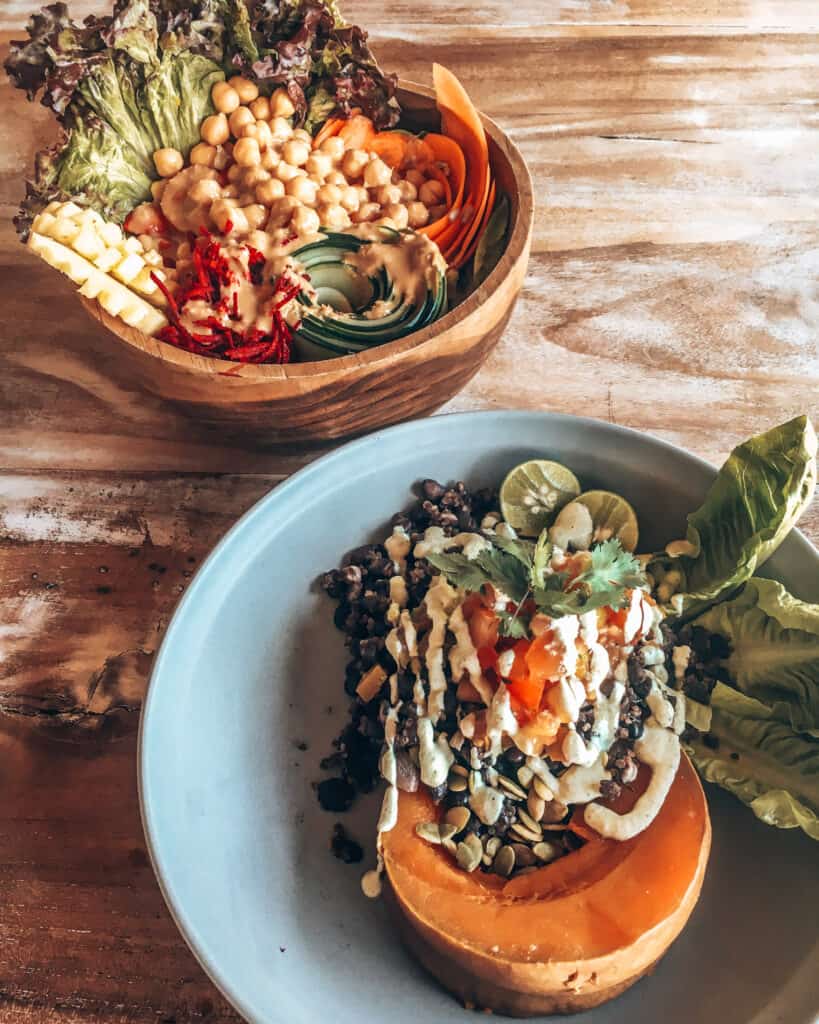
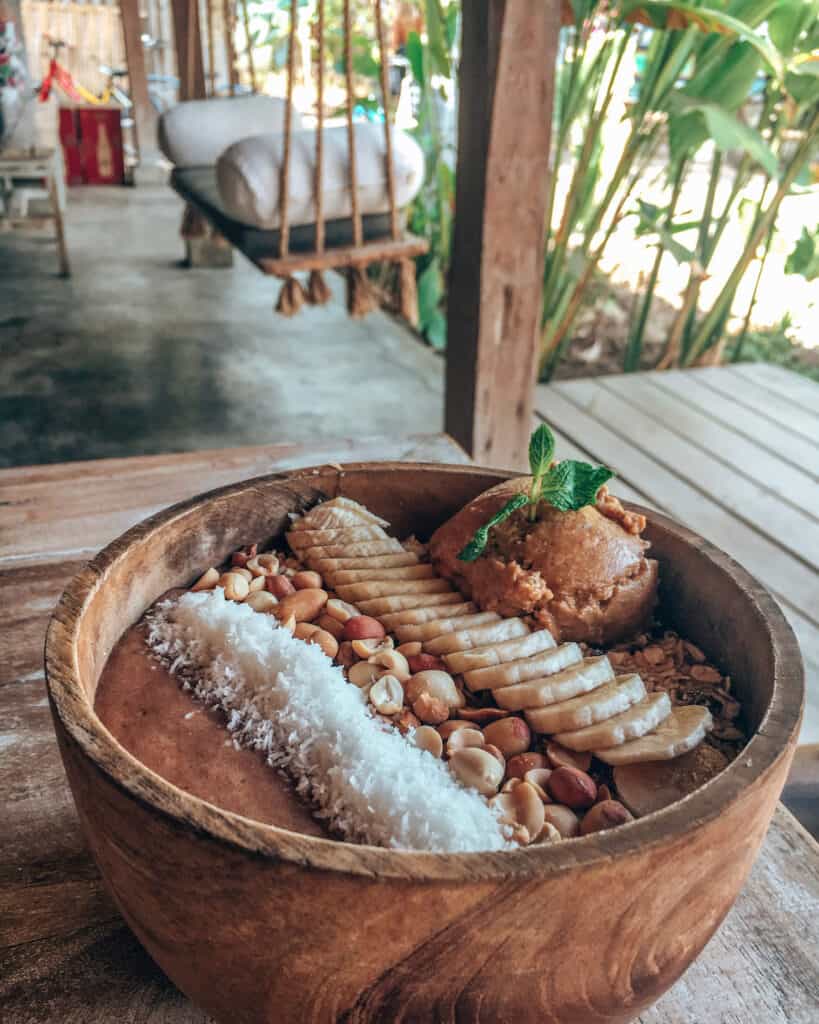
Plant-based meat alternatives
In the recent past, many meat alternatives got released to the market. By now, it’s possible to find a vegan option for almost every animal food. For example, vegan burger patties, vegan cheese, vegan bread, vegan ice cream, vegan sweets, and many more. Even though all of those products are vegan, it’s not a good idea to eat them every day. Not all, but most of these products are like regular convenience food, a combination of highly processed ingredients, oil, and sugar. Just because it’s vegan doesn’t mean it’s healthy.
We only eat animal alternatives like vegan burgers or cheese from time to time, and only on special occasions. At all other times, we strive for fresh fruits, vegetables, nuts, seeds, beans, and legumes.
Eat Yourself Healthy
If you’re interested in reading more, please check out our book Eat Yourself Healthy – You Are What You Eat. You will learn the basics of a balanced and healthy diet and develop an understanding of the positive effects of plant-based food on our bodies.
Eat Yourself Healthy
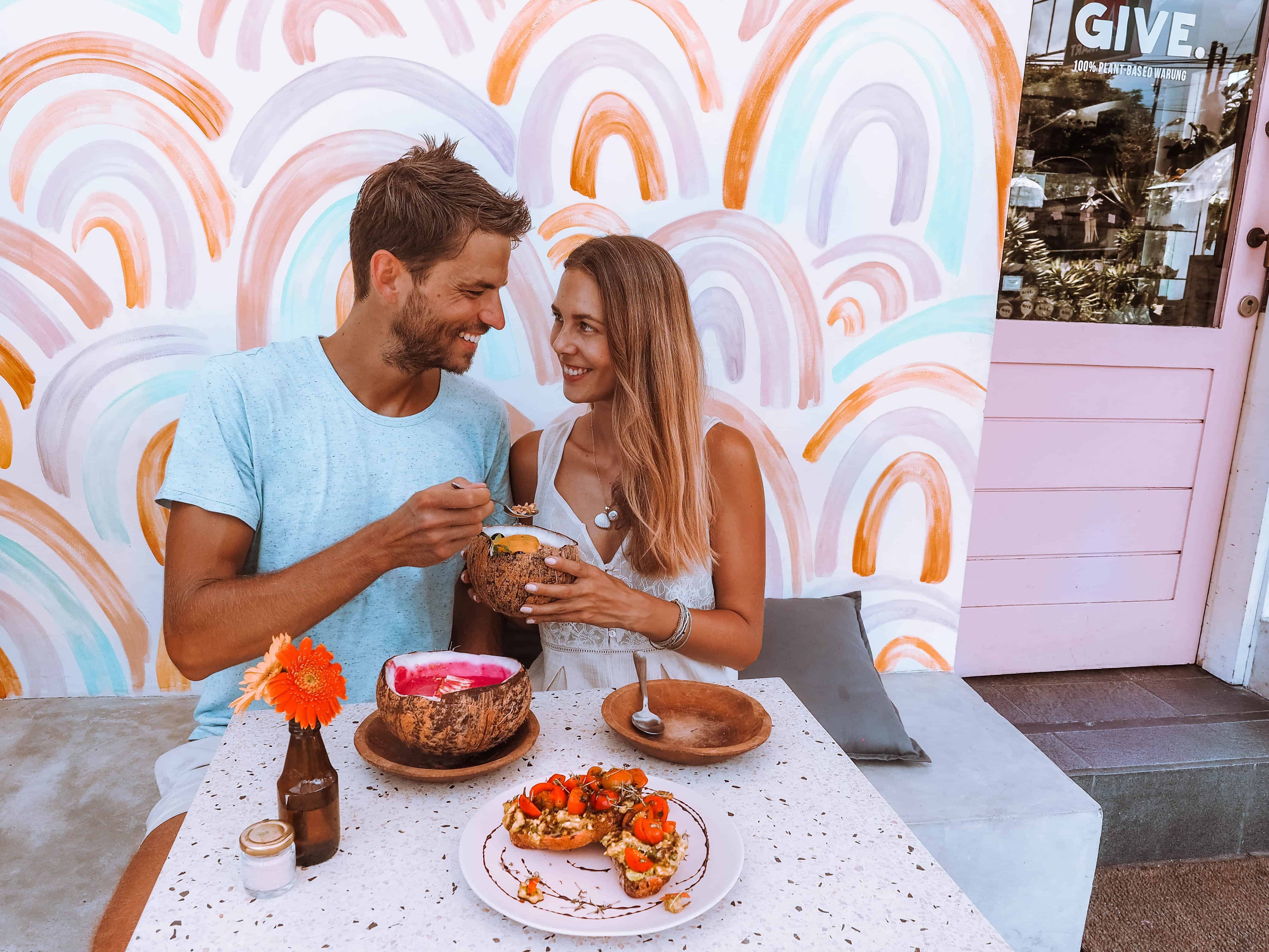


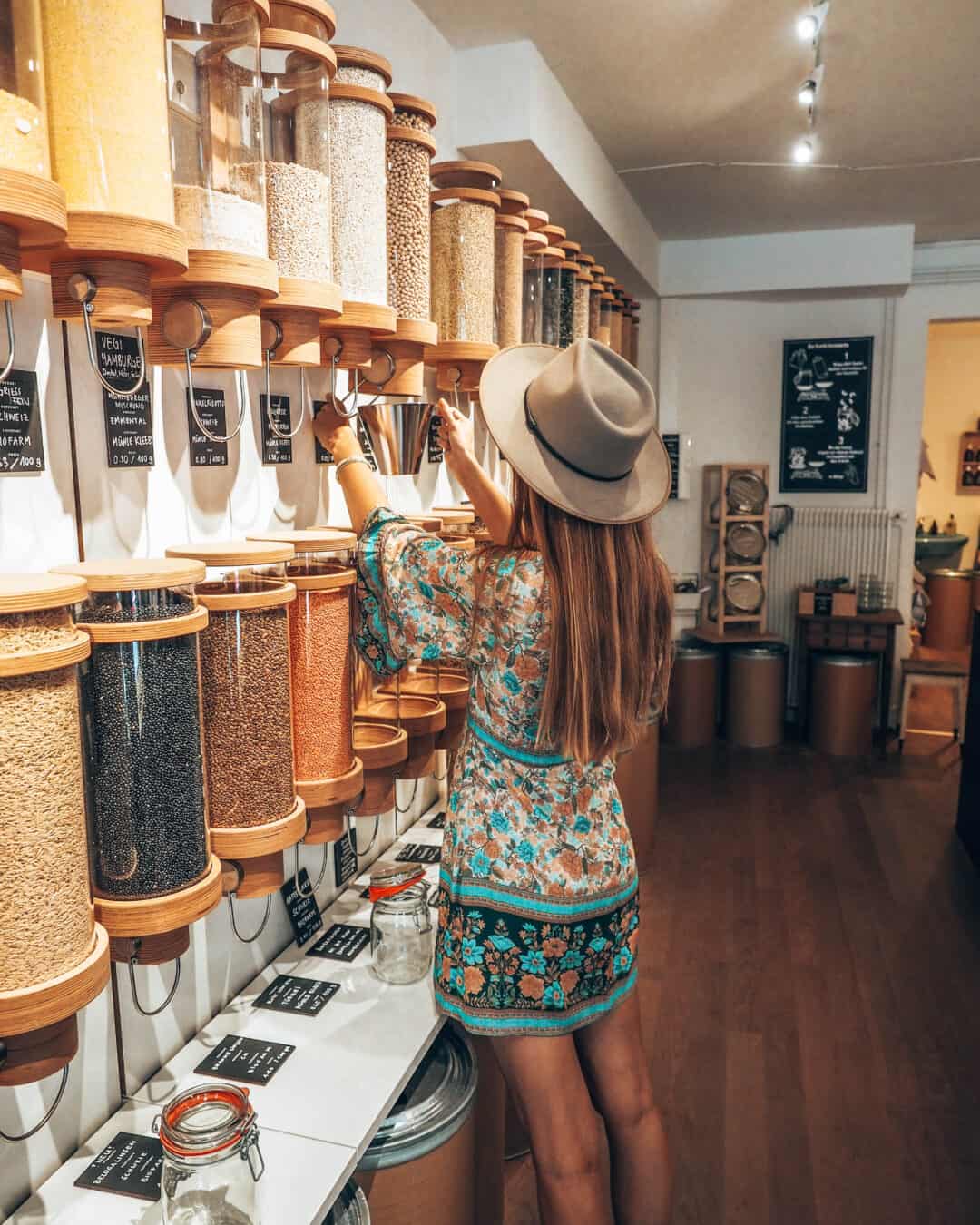
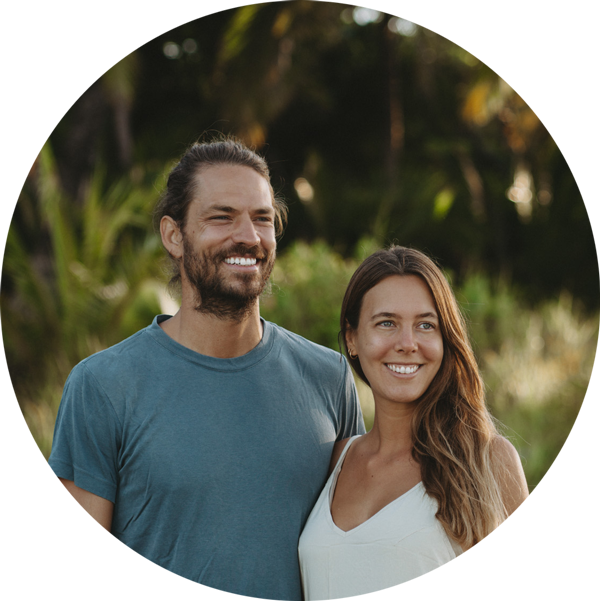







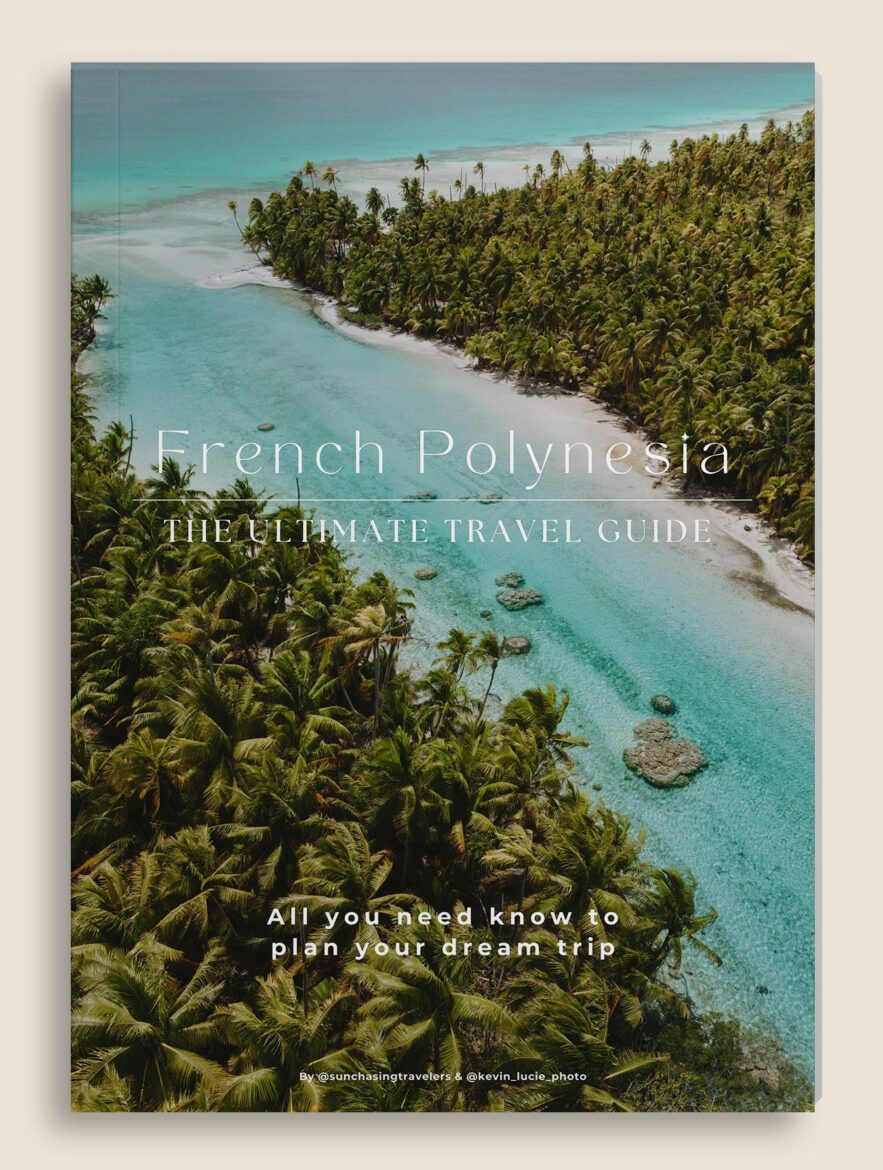
LOVE this detailed post about your own journey towards veganism as well as tips for others to do the same. The difficult part for us was definitely milk chocolate and cheese but we felt that once we changed our habits, the cravings disappeared after a while. And also, we don’t like to consume it when it so obviously cause harm to the cows 🙁 Luckily, now is such a great time to be/go vegan as vegan products and meal options are (almost) everywhere and they are gooood! Your photos in this post is proof of that and they have made… Read more »
Hi dear friends,
Thank you so much for sharing your thoughts about our blog post with us. As you said, now it‘s the right and best time to switch. Every day, we discover new amazing places to eat great vegan food. We love it!
Hope to meet you soon and have a great time together.
Best wishes, Lea and Stefan